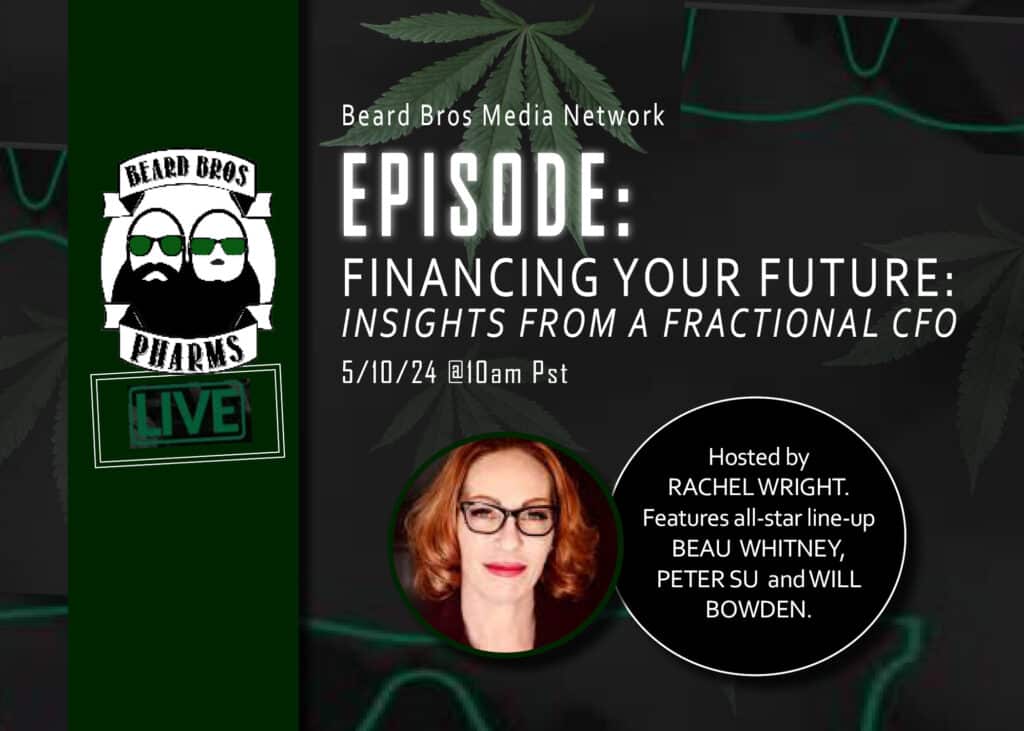The Beard Bros Media Network Live Series’ recent episode, Financing Your Future: Insights From A Fractional CFO, hosted by Rachel Wright and featuring an all-star line-up of Will Bowden, Peter Su and Beau Whitney, revealed unique opportunities to solve a hurt cannabis industry and its fragile financial ecosystem.
More opportunities discussed by Wright and guest lineup of Whitney, founder and chief economist at Whitney Economics; Su, leading financial and banking consultant for cannabis businesses; and Bowden, CEO and COO of Grasshopper Farms, involved changing state and business environment perceptions, eliminating plug-and-play practices, seeking complementary collaborations and placing more effort on industry contributions.
Success In One State Or Business Environment Doesn’t Guarantee Success In Another
Hurting the industry and financial ecosystem are certain cannabis operations and how they relate to different states, or more specifically, how they are or aren’t built for it. “Each state has its own market. It’s about how to write and execute a business plan that’s built for that particular state. We [currently] see successes in one state and try to apply business practices that worked in that regulatory or business environment to another state.”
Bowden added, “I think we see this a lot as folks are expanding throughout the United States. They might take something that’s a well-intended business practice from another place and try to apply it to a new place, and it just doesn’t quite land the way it should there. It’s because it arises from each state being different, and not just from an operator perspective.”
Many regulators who try to copy and paste from various markets, replicating the same mistakes from a regulatory perspective from one state to the other, must avoid this. Rather, as Bowden suggested, “It’s really important to understand each market and then develop a hybrid model where you take elements of one state and another state and another state and then customize it for your operation in the state that you’re targeting. And it’s not plug and play. You can’t just take one state and municipality from one place and apply it to the other.”
He, along with Su and Whitney, agreed that full attention must be paid to state and local regulations in order to customize and effectively place business ops and models in a certain state while still using elements from others. They, together, also strongly recommended operators to start working with state and local regulators to help this in-state application of new businesses. “But here’s the key. Go talk to them. Be a part of their process. Help them understand how you work in your farm versus how they think you do because they don’t operate a farm.”
Think Complementary, Not Competitively
Hurting the industry too, municipalities and states continue to “split the baby” while operators and retailers continue to think of the cannabis landscape as competitive. With more focus on competitiveness rather than complementary thought, consideration needs to be made, in a complementary light, to working with others in the cannabis industry.
Considering the question of picking others to work with, Bowden stated, “This is really, really important. So we at Grass Opera Farms don’t believe that we have a competitive landscape. We have a landscape in which we complement each other. So it’s a complementary operator landscape for those who know how to run a business.”
He continued, “But there’s a lot of people I think who got into the industry too, where they’re very enthusiastic about cannabis, but they’re not quite sure how to run a business. And so in picking the people that you work with, you really have to go through that dating period and to ask questions. How is this person or company to work with administratively? Do they pay their bills on time? Are they going out to consumers with the same sorts of synergies and things that make sense to you as well.”
Build Together And Contribute To An Industry Voice, While Still Giving Grace
Following the ending of the latter discussion sub-points, more solutions were brought in the conversation. Along with complementary collaboration, Su, Bowden, Whitney and Wright revealed how important operators, retailers, and other industry players were to the healing of a present damaged industry through contributions – contributing to surveys, attending luncheons, joining or aligning with an industry association and other effective coalitions.
Established industry players, and old industry cannabis folk, should, through contributions, as revealed in the episode, “Get the voice out there so that we can all build this together.” At the same time, as recommended by the guests, big players should give grace to newer industry entries. “It’s all while giving each other grace to say that this is new for a lot of people and it’s just not going to be easy and free flowing right out of the gate.”
To heal a fragile financial ecosystem and damaged, hurt industry, “It’s going to take a little time here. Definitely,” stated Wright. However, with immediate solutions and recently revealed opportunities presented in this Beard Bros Media Network’s live episode, healing can begin with the rebuilding of a future market, and fragility and damage within the current industry and its financial ecosystem reversed.
*The above article pertains to one discussion point from Financing Your Future: Insights From A Fractional CFO, a multi-faceted episode. For other articles that feature more relevant and must-read discussions from this specific episode, click here. For more episodes, past and upcoming, from Financing Your Cannabis Future, or other marketing, branding and business episodes, click here and subscribe to our Beard Bros Network Media Live Series YouTube Playlist. New to this B2B live series? Read more here.
More than 19 years’ experience in digital marketing, media, public relations, print journalism and content marketing,

















